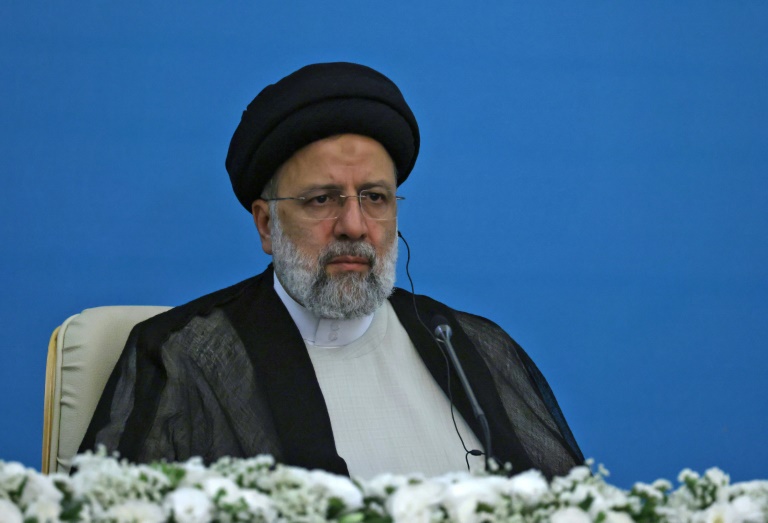Iran’s Raisi: ultraconservative marks one year in power

Iran’s President Ebrahim Raisi inherited the reins of a country in the grip of a deep social crisis against the backdrop of an economy strained by US sanctions
Tehran – Always solemnly dressed in his long religious coat and black turban, Iranian President Ebrahim Raisi was elected last year without any previous administrative experience, and now faces the gruelling task of fulfilling his campaign promises.
The 61-year-old won a June 2021 presidential election in which more than half the electorate stayed away, after several heavyweights were barred from standing.
He inherited the reins of a country in the grip of a deep social crisis against the backdrop of an economy strained by US sanctions against Tehran.
After portraying himself as a pious, corruption-fighting champion of the poor, Raisi has found himself faced with what experts consider an abysmal budget deficit.
In May this year, he announced austerity measures, including the abolition of subsidies on essential food items including flour. The move caused a sharp increase in the price of some staples, triggering protests against alleged corruption and the high cost of living.
Raisi was sworn in on August 5, 2021, succeeding moderate Hassan Rouhani, who had beaten him in the previous presidential election and whose signature achievement was a 2015 nuclear deal with world powers that gave Iran relief from international sanctions.
Like other ultraconservatives, Raisi harshly criticised his predecessor’s camp after then president Donald Trump unilaterally withdrew the United States from the nuclear pact in 2018 and reimposed punishing sanctions on Iran.
– Judicial veteran –
Born in 1960 in northeast Iran’s holy city of Mashhad, Raisi rose early to high office.
Aged just 20, in the wake of the 1979 Islamic revolution that toppled the US-backed monarchy, Raisi was named prosecutor-general of Karaj, which neighbours Tehran.
He served as Tehran’s prosecutor-general from 1989 to 1994, deputy chief of the Judicial Authority for a decade from 2004, and then national prosecutor-general in 2014.
In 2016, supreme leader Ayatollah Ali Khamenei put Raisi in charge of a charitable foundation that manages the revered Imam Reza shrine in Mashhad and controls a large industrial and property asset portfolio.
Three years later, Khamenei appointed him head of the Judicial Authority.
Raisi is also a member of the assembly of experts who select the supreme leader.
While not renowned for his charisma, Raisi in his former post as head of the judiciary spearheaded a popular campaign to prosecute corrupt officials.
His black turban signifies direct descent from Islam’s Prophet Mohammed, and he holds the title of “hojatoleslam” — literally “proof of Islam” — one rank below that of ayatollah in the Shiite clerical hierarchy.
Many Iranian media outlets have seen him as a possible successor to the country’s supreme leader.
Wearing a salt-and-pepper beard and thin glasses, Raisi studied theology and Islamic jurisprudence under Khamenei.
He is married to Jamileh Alamolhoda, an educational sciences lecturer at Tehran’s Shahid-Beheshti University. They have two daughters.
During the election season, Raisi garnered support from traditional conservatives — who are close to the Shiite clergy and the influential merchant class — as well as ultraconservatives, who are united in their anti-Western stance.
He also sought to extend beyond his traditional base by pledging to defend “freedom of expression” and “the fundamental rights of all Iranian citizens”.
– Morality police –
But in recent weeks, the resurgence of Iran’s morality police has sparked controversy, with incidents involving women deemed not complying with Iran’s mandatory Islamic head-covering requirements.
The morality police had become a much less common sight during Rouhani’s eight-year tenure.
Raisi is on Washington’s sanctions blacklist for complicity in “serious human rights violations”, charges rejected as null and void by the authorities in Tehran.
For Iran’s exiled opposition and human rights organisations, his name is a reminder of mass executions of Marxist and other leftists in 1988, when Raisi was deputy prosecutor of the Revolutionary Court in Tehran.
Asked in 2018 and again in 2020 about the executions, Raisi denied playing a role, even as he lauded an order he said was handed down by the Islamic republic’s founder Ayatollah Ruhollah Khomeini to proceed with the purge.
When the “Green Movement” in 2009 rallied against populist president Mahmoud Ahmadinejad’s winning a disputed second term, Raisi was uncompromising.
“To those who speak of ‘Islamic compassion and forgiveness’, we respond: We will continue to confront the rioters until the end and we will uproot this sedition,” he pledged.
